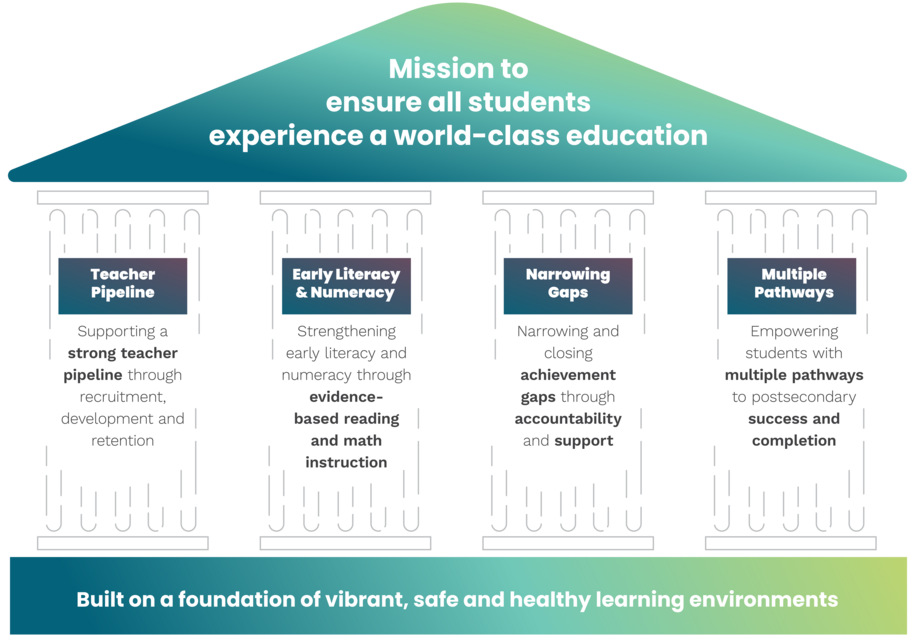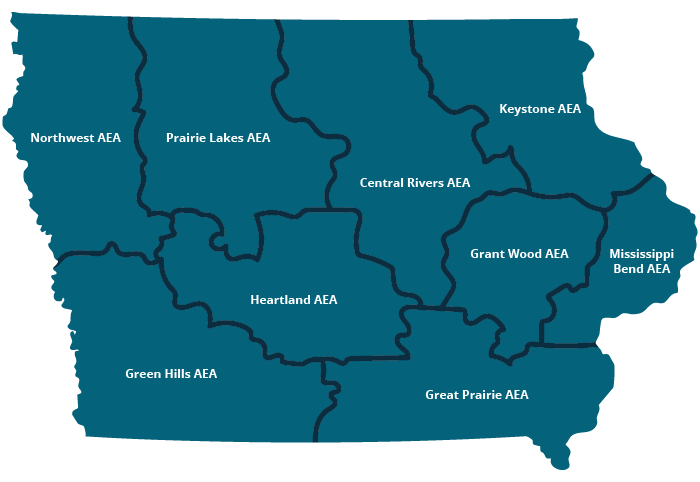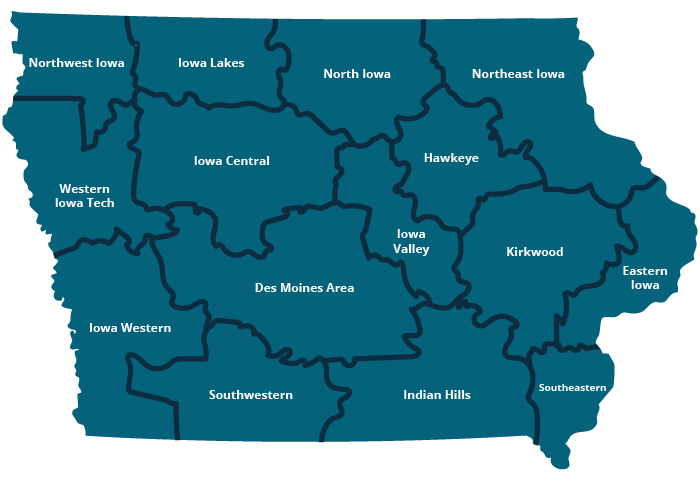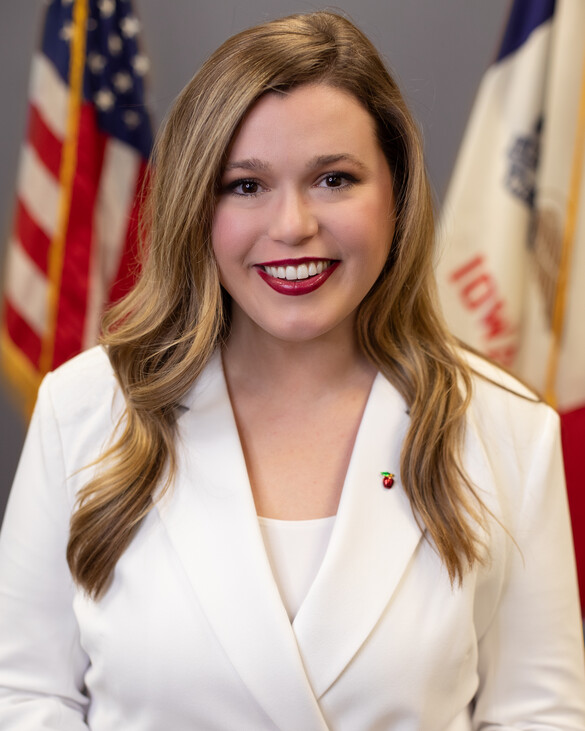On this page...
The Department provides oversight to the state education system that includes PK-12 public elementary and secondary schools, nonpublic schools that receive state accreditation, area education agencies, community colleges, and teacher preparation programs. The Department works to remove barriers for pursuing education beyond high school. The Department also establishes and enforces rigorous standards and licensing for Iowa educational practitioners to effectively address the needs of students. Under the leadership of the Iowa Department of Education Director and in partnership with the State Board of Education, Department team members, in collaboration with a wide range of community partners, support schools and districts as they prepare students for college and career training and ensure they receive the support needed to succeed.
Back to topIowa's Bold Vision, Mission & Priorities
Vision
Building an excellent education system that empowers all students to achieve their full potential.
Mission
Ensure all students experience a world-class education.
Priorities
Department priorities are built on a foundation of vibrant, safe and healthy learning environments.
- Teacher Pipeline - Supporting a strong teacher pipeline through recruitment, development and retention.
- Early Literacy and Numeracy - Strengthening early literacy and numeracy through evidence-based reading and math instruction.
- Narrowing Gaps - Narrowing and closing achievement gaps through accountability and support.
- Multiple Pathways - Empowering students with multiple pathways to postsecondary success and completion.

Delivering Remarkable Results
Iowa is delivering remarkable results. Find key data points of growth and achievement in the 2024-25 Iowa Delivering Remarkable Results for Students Across Five Key Measures Fact Sheet (661.18 KB) .pdf and Infographic (2.8 MB) .pdf .
Back to topOrganization & Structure
Following state alignment of agencies, the Department now includes Iowa College Aid, the Board of Educational Examiners, IowaPBS, the Iowa School for the Deaf, the Iowa School for the Blind and Visually Impaired and the Governor's STEM Advisory Council.
- Table of Organization (78.21 KB) .pdf
- Iowa Department of Education Department Directory
- Iowa Department of Education Alphabetical Directory
Director of the Iowa Department of Education
The Department director is appointed by the Governor to serve a four-year term, subject to confirmation by the Iowa Senate. The director's role is to provide leadership for the department as it carries out the policies and programs prescribed by state law and the State Board of Education; and to ensure department personnel are providing the necessary oversight and support for all schools, educators and students to meet their academic goals. The department director also serves as the executive officer of the State Board of Education, a nonvoting role.
Director McKenzie Snow
Gov. Kim Reynolds appointed McKenzie Snow to lead the Iowa Department of Education beginning June 26, 2023.
Director Snow is committed to ensuring all children have access to a high-quality education that inspires them and prepares them for the future. As director, her work is grounded in high-quality teaching and learning, family and teacher empowerment, evidence-based innovation, college and career pathways, transparency and student-centered funding and supports.
Director Snow began her work in the classroom teaching remedial courses at the University of the Free State in South Africa. She served as Virginia Deputy Secretary of Education over early childhood education through postsecondary pathways and as New Hampshire Division Director of Academics and Assessment, Special Education, Career Development, Adult Education, Wellness and Nutrition following her confirmation.
She also served in the federal government as a special assistant to the President at the White House Domestic Policy Council, senior adviser at the Office of Management and Budget, and policy director at the U.S. Department of Education. Prior to government service, Snow was policy director at the Foundation for Excellence in Education.
Snow has been named a Fulbright grantee, Rotary Ambassadorial Scholar, and Bush Institute and Clinton Foundation Presidential Leadership Scholar. She is a proud fifth-generation Midwesterner.
Statements in support of Director Snow’s appointment
Virginia Governor Glenn Youngkin:
“The nation is watching what we’re doing in Virginia and McKenzie Snow knows first-hand what it takes to build a best-in-class education partnership with parents, families and educators. The incredible record Gov. Reynolds has amassed on education for all Iowans will be strengthened by McKenzie’s appointment and I am proud of what she will bring to the Reynolds Administration.”
Former Florida Governor Jeb Bush, founder and chair of the Foundation for Excellence in Education (ExcelinEd):
“Congratulations to Gov. Kim Reynolds for selecting McKenzie Snow to lead the Iowa Department of Education. In her public service roles, McKenzie has proven time and again that she is committed to students, educators, and families, and she will be a strong leader as Iowa expands and implements a number of critical education policies championed by Gov. Reynolds.”
Aimee Rogstad Guidera, Virginia Secretary of Education:
“Director Snow is a national education leader who has demonstrated success in supporting public school innovation, strong teacher pipelines, literacy, postsecondary pathways, and transparency and accountability. Her work in Virginia was invaluable and I know her leadership will serve Iowa's students, parents, and teachers well.”
Andrew Rotherham, Virginia Board of Education Member:
“McKenzie spearheaded important work here in Virginia to address the impact of pandemic policies and learning loss and make sure public education works for every family. She's a tireless advocate for policies that work for students and never loses sight of what is most important in discussions about education: young people. Iowa is a great next step in her leadership and that state is lucky to have her in this role.”
Patricia Levesque, CEO of ExcelinEd:
“McKenzie is a respected professional in the world of K-12 education policy, and we are excited for her to take on this new leadership role. I am confident that she will put Iowa families first and lead the department from a place of knowledge, compassion, and years of experience.”
Rick Hess, American Enterprise Institute Director of Education Policy Studies:
“McKenzie Snow is a terrific choice to lead Iowa’s schools. She’s a principled, savvy, and fearless champion of educational excellence and empowered families. Iowa’s students are in good hands.”
Back to topIowa's Education System
Iowa's public education system includes:
- Local school districts serving students in pre-kindergarten through 12th grade
- Area Education Agencies (AEAs) that provide support and assistance to the districts in a given region
- Community colleges that provide a wide range of coursework to students of all ages
- Four-year colleges and universities
The Iowa Department of Education and State Board of Education are responsible for the local schools, AEAs, and community colleges, while the Iowa Board of Regents is responsible for the state's three public four-year universities.
Local School Districts
Each local school district in Iowa must offer a complete education in all grades from kindergarten through 12th grade. All state residents are entitled to free public education up to age 21 and state law requires that all learners between the ages of 6-16 attend school either in their assigned "resident" district, through open enrollment to another district, or through private instruction (home schooling).
Quick facts about Iowa public schools*
- Districts: 325
- School Buildings: 1,316
- Students: 483,699
- Graduation Rate: 87.5% (class of 2023)
- Teachers: 37,982
* Data from The Annual Condition of Education Report: 2024 (19.1 MB) .pdf
A "Local Control" State
While local districts are governed by state and federal laws that set broad parameters regarding coursework requirements, assessments, and teacher qualifications, each has its own locally elected board of directors that sets specific policy, defines academic requirements, and approves the local budget.
Accreditation
Districts are accredited through a differentiated accountability system. All districts and accredited nonpublic schools submit information to the state Department of Education to ensure the district is meeting state and federal requirements. Based on this information, districts may receive additional support as needed to meet requirements and/or to engage in continuous school improvement.
Iowa Academic Standards
Iowa’s academic standards outline and define what students should be able to do at specified grade levels by subject area; they do not prescribe or mandate any particular curriculum. Each district selects its own local curriculum, textbooks and other classroom materials. Iowa Administrative Code 281-12 outlines requirements for local school boards to establish procedures for developing, implementing and evaluating their district’s total curriculum.
Generally, elementary grades 1-6 must teach language arts, social studies, math, science, health, physical education, traffic safety, music and visual arts.
Junior high grades 7-8 must teach language arts, social studies, math, science, health, human growth and development, physical education, music, visual art, family and consumer education, career education and technology education.
High school grades 9-12 must offer at a minimum six units of language arts, five units of social studies, six units of math, five units of science, one unit of health, one unit of physical education, three units of fine arts, four units of foreign language, and 12 units of vocational education.
Teacher Qualifications
All classroom teachers must be properly licensed and certified in their subject area. Licensure requirements are set by the Iowa Board of Educational Examiners.
Area Education Agencies (AEAs)

Iowa has nine area education agencies or AEAs. AEAs are regional service agencies that provide school improvement services for students, families, teachers, administrators, and their communities. Each AEA is governed by a locally elected board of directors of between five and nine members, responsible for ensuring the AEA operates in the best interests of the students in accordance with state law.
The AEAs work as educational partners with public and accredited private schools. Agency staff members, school staff, and families work together to help all children reach their highest potential.
Visit the Iowa AEA website for more information.
AEA Websites
Central Rivers AEA
Grant Wood AEA
Great Prairie AEA
Green Hills AEA
Heartland AEA
Keystone AEA
Mississippi Bend AEA
Northwest AEA
Prairie Lakes AEA
Community Colleges

Iowa has a statewide system of 15 community colleges. These public, postsecondary, two-year institutions are organized as comprehensive community colleges. Each college serves a multi-county merged area that may vary in size from four to twelve counties; all of Iowa's 99 counties are included in one of these merged areas.
Community colleges are governed by locally elected boards of directors that consist of from five to nine members who are elected for terms of three years. Each community college offers a comprehensive educational program. All Iowans of postsecondary school age are eligible to attend any of the community colleges. Community colleges also offer special programs for students who attend local secondary schools.
Back to topHistory
The Department was created by the 35th General Assembly in 1913 and was originally called the Department of Public Instruction. The current name was adopted in 1986.
In its early years, the Department was charged with working with the many small, isolated school buildings to build a formal system of public education that included organized districts with defined duties and boundaries, as well as specific qualifications for teachers. While the state department was established to provide oversight, local schools maintained the authority to set many of the rules and requirements for their own students. This system of "local responsibility" – based on the belief that local residents have the greatest interest in assuring their children's success – continues today.
As Iowa grew over the decades to encompass greater diversity in business, industry and population, the public education system evolved to reflect those changes. In the 1960s, a system of 15 public, two-year community colleges was established to provide more students the opportunity for continued education and training beyond high school. In the mid-1970s, the system of AEAs was developed to provide regional support for local schools and their teachers. Originally, the community colleges and the AEAs shared the same service area boundaries. Since then, several AEAs have merged to provide greater efficiency in regions with declining populations.
As part of the state’s alignment of state agencies in 2023, the Department took on other state agencies – the Board of Educational Examiners, Iowa College Aid, the Governor’s STEM Advisory Council, Iowa School for the Deaf and Iowa Educational Services for the Blind and Visually Impaired – to better streamline services for Iowans.
Back to top